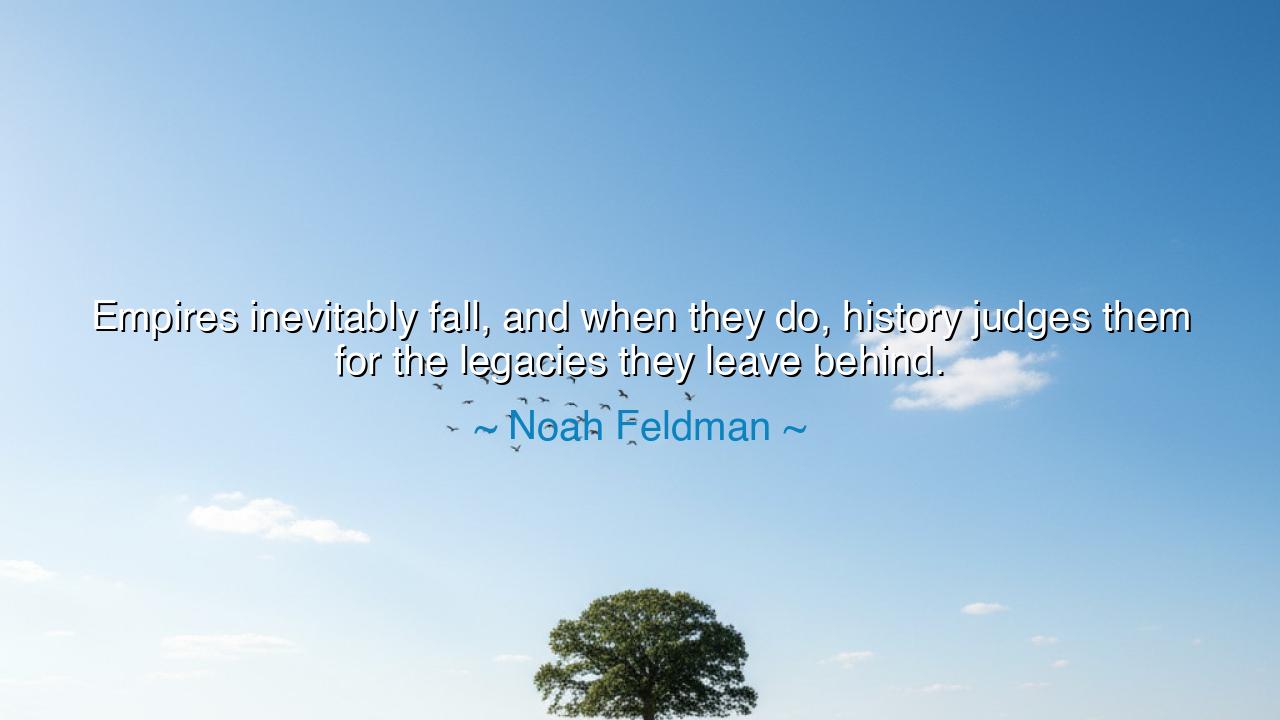
Empires inevitably fall, and when they do, history judges them
Empires inevitably fall, and when they do, history judges them for the legacies they leave behind.






“Empires inevitably fall, and when they do, history judges them for the legacies they leave behind.” — Thus spoke Noah Feldman, scholar of law and governance, whose words carry the weight of centuries. His voice is not one of cynicism, but of truth — the truth that no power, however mighty, endures forever. From the dawn of civilization to the present hour, the fate of empires has always followed the same solemn rhythm: ascent, glory, decline, and fall. Yet beyond their ruins, beyond the dust of their monuments and the silence of their palaces, there remains a question far greater than their power: What did they leave behind?
To say that empires inevitably fall is to acknowledge the natural law of history — the law that humbles all human ambition. Nothing built by mortal hands escapes time’s erosion. The might of armies fades, the brilliance of wealth dims, and the voices of rulers are swallowed by the wind. Yet Feldman’s words remind us that though the empire itself may perish, its legacy endures — a living echo that shapes the future. For when the dust of conquest settles, what remains is not how loudly an empire ruled, but how deeply it influenced the hearts and minds of those who followed.
Consider the Roman Empire, once the heart of the known world. Its legions stretched from the deserts of Arabia to the misty isles of Britain; its cities gleamed with marble and gold. Yet even this empire, which seemed eternal, crumbled beneath the weight of corruption, division, and time. But though Rome fell, its legacy lived on. Its laws became the foundation of justice in the Western world; its architecture shaped the skylines of nations; its language became the seed of many tongues. Thus, history did not remember Rome merely for its power, but for the civilization it bequeathed to humanity.
And look, too, to the British Empire, whose reach once spanned the globe. It brought both enlightenment and oppression, both progress and pain. It spread ideas of governance, trade, and science, yet also left wounds of exploitation and division. History now weighs its balance — neither wholly condemning nor wholly praising, but examining its legacy with the scales of truth. So it is with every empire: their judgment lies not in their victories, but in the consequences of their rule. For history is the conscience of the world, and it forgets nothing.
Feldman’s wisdom is not merely for nations, but for all who wield power, whether great or small. Every person builds their own kind of empire — of influence, of labor, of love. And just as with nations, these personal empires will one day pass. The question is not if they will end, but what will remain. Did we act with integrity? Did we uplift others, or use them for our gain? Did our work leave the world more just, more kind, more whole? These are the questions by which history — and eternity — judge us all.
There is a story told of Ashoka the Great, ruler of the Mauryan Empire in ancient India. After years of conquest and bloodshed, he looked upon the battlefield of Kalinga and saw the price of his ambition — thousands dead, a kingdom in ruins, and his own soul hollowed by victory. In that moment, he turned from war to wisdom, dedicating his reign to peace, tolerance, and the spread of the teachings of compassion. His empire too would one day fade, yet his legacy endured — not of conquest, but of conscience. Even now, more than two thousand years later, his name is remembered not for the battles he won, but for the mercy he chose.
So, my listener, take this lesson to heart: all things built on pride and greed are destined to fall, but those founded on truth and virtue endure beyond time. The true measure of greatness lies not in dominion, but in legacy — in what we create that uplifts the generations to come. Empires of cruelty crumble into oblivion; empires of wisdom become the bedrock of the future. Therefore, build not to be remembered for your power, but for your goodness.
And when your own life passes into history’s care, may it be said of you — not that you ruled, or conquered, or amassed, but that you left something worthy behind. For as Noah Feldman teaches, all empires fall, but their legacies endure. Choose, then, your legacy with care — for it is the only empire that time cannot destroy.






AAdministratorAdministrator
Welcome, honored guests. Please leave a comment, we will respond soon